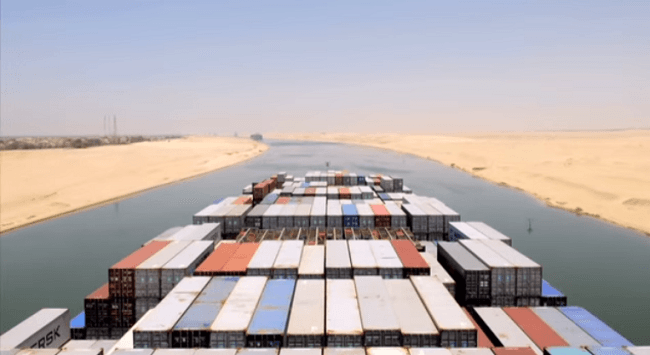

The occurrence of a few incidents results in the long-term change of the world perspective towards a particular community or a society or a country in its entirety. The Suez Canal crisis is one such event which changed the course of maritime history, causing a major turmoil in the horizon of the world politics’ scenario.
The Suez Canal
The Suez Canal is a crucial navigational route for ships wanting to pass through the Mediterranean Sea. The canal connects and forms a gateway for the Middle-east, Europe and Asia making it an unavoidable trade route for commercial shipping vessels.


The Crisis
The Suez crisis was a final showdown on turbulence brewing between the Middle-eastern nation and the British Empire towards the late 1940s and the early 1950s.
Egypt was a British colony and as such the Suez Canal, which formed a vital part of the country, was the crux of the British armed forces. Controlled by the Anglo-French collaboration – the Suez Canal Company, the canal’s entrance points were impenetrable even by the local Egyptians. The extreme control by the British led the Egyptians to demand their independence as a British colony.
The local resistance posed by the Egyptians led by Colonel Gammal Abdel Nassar and the measures employed by Sir Anthony Eden – the then British Prime Minister – to hold onto the vestiges of British control over the region, finally culminated when Egypt gained independence after more than seven decades of colonial rule.
Sworn-in unanimously as the new president, Gammal Nasser immediately nationalised the Suez Canal against the still-prevailing Anglo-French ownership on the 26th July 1956. This decision was triggered by the joint negation of the American, British and French authorities to finance the construction of the High Dam in Aswan.
The growing political relationship between the USSR and Egypt also led the British and the French to join hands with Israel to overthrow the Nasser rule. Accordingly, when talks with the Egyptian government failed, Israel launched an attack on the Suez Canal on the 29th October 1956 and succeeded in occupying key areas in the Sinai Peninsula and the whole of Gaza Strip by 31st October 1956.
The British and the French forces launched an attack on Port Said and Port Fuad before successfully capturing these two pivotal locations on the 5th November 1956. These attacks escalated the already high post-war tensions brewing in the world between the communist Soviet Republic and the other non-communist countries.
Finally with the United Nations’ intervention, the Suez Canal War came to an end, when on 22nd December 1956; the Anglo-French troops finally evacuated the region. On the 1st march 1957, the captured areas in the Sinai province were handed back to Egypt, as Israeli forces too evacuated the epicentre of the war.
Aftermaths & Conclusion
Post the conclusion of the Suez Canal War, a lot of turnabouts came to occur. For instance the British supremacy in the world came to be doubted for the first time in the nation’s history, while the United States’ role in world politics came under a much brighter spotlight.
The Canadian effort to push the United Nations to intervene in the Suez Crisis, through the formation of the UN peacekeeping force was highly appreciated. The then-Canadian foreign minister, Lester Pearson received the Nobel Peace Prize in the year 1957 for his campaign to maintain world peace.
The twin objectives of Gammal Nasser were the conquering of Egypt and Suez Canal. Both of these objectives were more than successfully met by the Egyptian politician, while Anthony Eden had to resign from his Prime Ministerial Chair because of an unnecessary war expedition.
A reputed and leading British newspaper claimed Anthony Eden to be an unwavering believer in the British supremacy while practicality unravelled before the British Empire. Contrarily, the motives and the methodologies employed by the Egyptian tactician Gammal Nasser came to be widely-acknowledged all over the world. This gave the world yet another glimpse of the resilience of smaller nations towards achieving their desired goals.










We believe that knowledge is power, and we’re committed to empowering our readers with the information and resources they need to succeed in the merchant navy industry.
Whether you’re looking for advice on career planning, news and analysis, or just want to connect with other aspiring merchant navy applicants, The Marine Learners is the place to be.